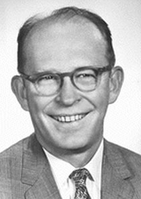










Willard Frank Libby was an American physical chemist noted for his role in the 1949 development of radiocarbon dating, a process which revolutionized archaeology. For his contributions to the team that developed this process, Libby was awarded the Nobel Prize in Chemistry in 1960.
While associated with the Manhattan Project (1941–45), Willard Libby helped develop the atomic bomb. Libby began experimenting with carbon-14, radiocarbon, in the late 1930s and discovered that it could be used to determine the age of very old things. In 1947, Libby obtained the first age determination using the carbon-14 dating technique and won the Nobel Prize for his discovery in 1960.
Libby was appointed Instructor in the Department of Chemistry at the University of California, Berkeley, in 1933 and during the next ten years was promoted successively to Assistant and then Associate Professor of Chemistry. He spent the 1930s building sensitive Geiger counters to measure weak natural and artificial radioactivity. In 1941 he joined Berkeley's chapter of Alpha Chi Sigma. He was awarded a Guggenheim Memorial Foundation Fellowship in 1941 and elected to work at Princeton University, but on 8 December 1941, this Fellowship was interrupted for war work on America's entry into World War II, and Libby went to Columbia University on the Manhattan District Project, on leave from the Department of Chemistry, California University, till 1945.Libby was responsible for the gaseous diffusion separation and enrichment of the uranium-235 which was used in the atomic bomb on Hiroshima.
In 1945 he became a professor at the University of Chicago. In 1954, he was appointed to the U.S. Atomic Energy Commission. In 1959, he became Professor of Chemistry at University of California, Los Angeles (UCLA), a position he held until his retirement in 1976. He taught honors freshman chemistry from 1959 to 1963 (in keeping with a University tradition that senior faculty teach this class). He was Director of the University of California statewide Institute of Geophysics and Planetary Physics (IGPP) for many years including the lunar landing time. He also started the first Environmental Engineering program at UCLA in 1972.
Although Libby retired in 1977, he, a member of the National Academy of Sciences, American Academy of Arts and Sciences, and the American Philosophical Society, remained professionally active until his death in 1980.
Elliott Cresson Medal (1957)
Willard Gibbs Award (1958)
Albert Einstein Award (1959)
Nobel Prize in Chemistry (1960)